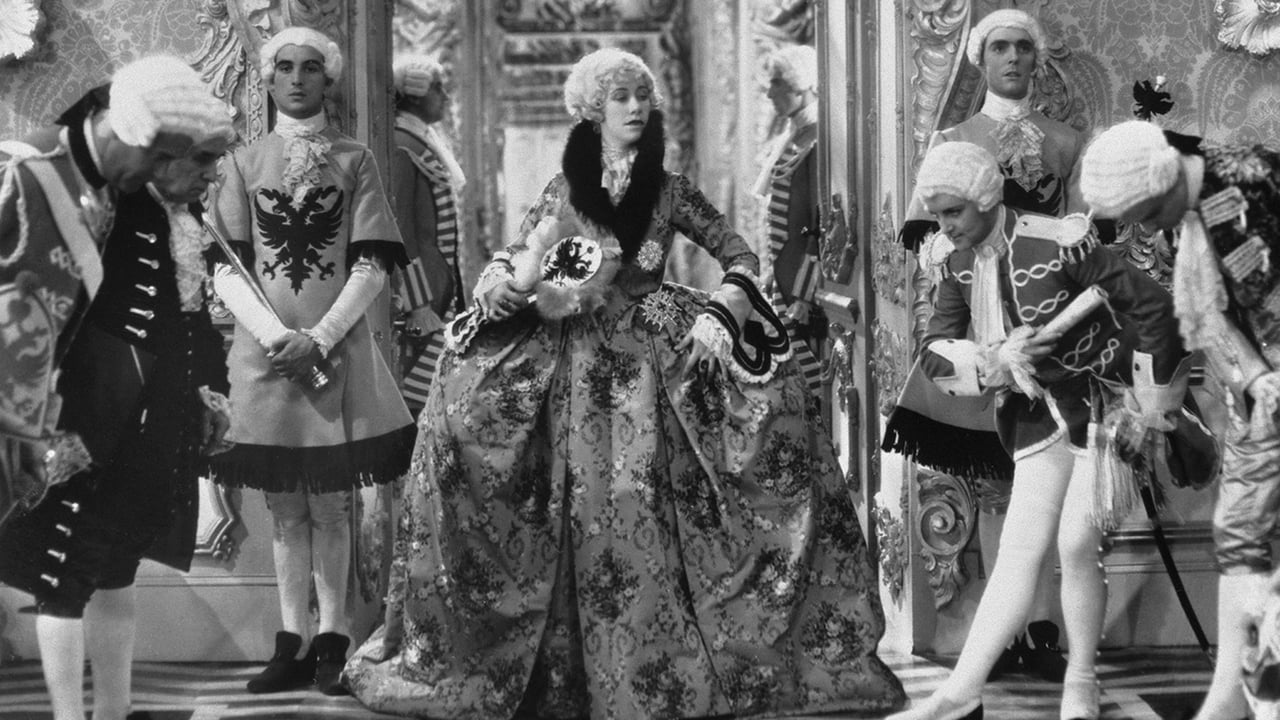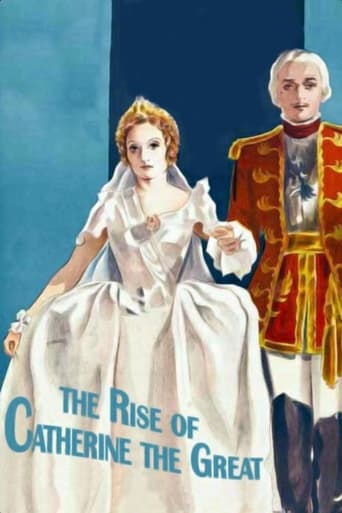

1934 was a strange year. While there have been relatively few films about Catherine the Great of Russia, apparently 1934 was an exception. Not only were there two big-budget films about her, but both covered the exact same period of her life--when she first comes to Russia to marry and ending when she assumes control of the nation. Of the two, my personal favorite was "The Scarlet Empress" with Marlene Dietrich. But, "The Rise of Catherine the Great" is still a pretty good film.Now I must stop for a minute to talk about the shortcomings of BOTH films. History, they say, is made by the winners and historians at the time seemed to spin Catherine's usurping the throne and the 'accidental death' of her husband as necessary because he was evil and insane. However, this is not the view of everyone--and many historians are just as convinced that she was a conniver and the only reason she was backed in her coup was that her husband was a reformer--and it was simply a case of the nobles wanting to keep their power. Whichever the case (and perhaps neither is correct), both films clearly portray Catherine in almost saint-like terms and a woman forced to take this action--which, by the way, would NOT fit her character later in her reign. In other words, she was one tough lady and probably not the little wall-flower you see in these films. After all, she went on to become one of the most powerful and feared of Russia's leaders.I think my biggest problem with this film, despite the nice direction by Alexander Korda, is that the script doesn't seem to know what sort of film it is. In the first half, it's a love story about Peter and his new bride, Catherine. Both care for each other but Peter later comes to believe that he was manipulated into the marriage and pulls away from his wife. Later, through clever manipulation, she wins his hearts. It's clearly a love story....period. Yet, oddly, as soon as the Empress is ready to die, the elderly lady (Flora Robson) tells everyone that Peter (her nephew) is crazy and dangerous. In light of everything we've already seen, there was no indication of this at all---none. And suddenly, Peter (Douglas Fairbanks) starts behaving crazy and very, very cruel and vindictive. As a result of many threats against his loving wife, Catherine (Elisabeth Bergner) is forced to fight fire with fire and she takes the throne. So what did the two halves of the film have to do with each other--just about nothing other than the names of the characters! While both halves were good, they just didn't fit together well. Additionally, I felt the weak point acting-wise was Bergner--whose interpretation of Catherine was way too weak and sentimental.My feeling is that this is a watchable film even if its accuracy is in question. But, how many want to watch two films on the exact subject? If you don't, then I suggest the Dietrich version instead--it's made better and the acting is better.
... View MoreFrom the new Eclipse box set Alexander Korda's Private Lives. I debated on whether or not to buy this one. I love The Private Life of Henry VIII, starring Charles Laughton, but haven't seen the others. They don't have very good reputations. And I usually say that I like neither biopics nor costume genres. Yet, strangely enough, I do like loopy historical biopics where the filmmakers have no real sense of history. They can be a lot of fun. The Rise of Catherine the Great is a pretty uneven film. It has its overly stuffy moments, and the acting is all over the place. The sets and visuals are nice, though not quite as opulent as in the other Catherine the Great movie made the same year in Hollywood, The Scarlet Empress. Neither of these movies are great, unfortunately. Neither are very well directed. The Rise of Catherine the Great works somewhat because of a couple of performances in it, as well as a small handful of excellent scenes. Elisabeth Bergner plays the titular character. Unfortunately, she's one of the most uneven parts of the film. As the ingénue Catherine, she's quite annoying. Her strong German-accented English makes her sound mentally retarded at times. But she is rather good later in the film when she is learning the ropes of royalty, or when she's trying to quell her husband's anger. The husband, Grand Duke Peter, is played by Douglas Fairbanks Jr. He might be the best thing about the film. Can't say I'm overly familiar with his career, but his performance is extremely good here. Flora Robson is also quite good as the empress Elisabeth.
... View MoreAlthough Marlene Dietrich was a far more glamorous Catherine the Great, closer to the real one was definitely Elizabeth Bergner in this British production from Alexander Korda. The former Princess Sophia of Anhalt-Zerbst, one of many small pieces of turf in Germany before that country became a country instead of a geographical expression, pulled off something unique in history. She came as a promised bride to the tsarevitch who in this case was Peter, nephew of the Empress Elizabeth of Russia. Through her own will and genius for intrigue, this Queen Consort, without a drop of royal blood of Russia in her, got to rule Russia and well for over 30 years after deposing her husband. Woman must have done something right.The film here like the one in Hollywood ends with the deposition and death of the Czar and Catherine taking over. We don't see the regal, confident, and promiscuous empress Catherine was to become. We see her as a shy and overwhelmed German Princess who grows in her role as her husband won't in his. Catherine grows in her character as Elizabeth Bergner does in this part.Sam Jaffe as Peter is far closer to the mark of the real character of that unfortunate soul than Douglas Fairbanks, Jr. is in this film. Yet Fairbanks gives an extraordinary performance, far from the swashbuckling parts that his father patented on the silent screen. In fact both the Fairbanks were in the UK at the same time. Fairbanks senior gave his farewell screen performance in the Private Life of Don Juan and his son did about seven films for four years of which this is probably his best effort.The pleasure loving Empress Elizabeth as done by Flora Robson is light years different from Queen Elizabeth in Fire Over England and The Sea Hawk that Robson did later, but still very nicely done.Alexander Korda perfectly captured the mood and feel of old Romanov Russia as taken over by a usurper, a popular one, but still a usurper.
... View MoreThe alternative title "The Rise of Catherine the Great" is much more accurate since the picture ends with her getting the throne.The costumes and sets are Grade A Hollywood (compliment).Flora Robson (Empress Elisabeth) has the best lines and delivers them impressively. Elisabeth Bergner (Catherine) does well in her scenes with the Empress. Douglas Fairbanks Jr. (Grand Duke Peter) seems out of his depth.
... View More